Frank Pierce Milburn
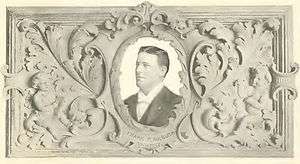
Frank Pierce Milburn (1868–1926) was a prolific architect of the late 19th and early 20th centuries. While Milburn designed commercial buildings and residences, his practice was primarily focused on public buildings, particularly courthouses and legislative buildings. Milburn was a native of Bowling Green, Kentucky who practiced as an architect in Louisville from 1884 to 1889; Kenova, West Virginia 1890-1895; Charlotte, North Carolina; Columbia, South Carolina; and Washington, D.C. after 1904. From 1902 Milburn was architect for the Southern Railway.[1]
Milburn pioneered a new approach to the marketing of architectural services, publishing sponsored books of his work, placing advertisements in trade publications, entering competitions and moving his office to suit available opportunities.[2] This resulted in work in every Southern state apart from Mississippi.
Milburn was particularly successful in obtaining commissions for significant public buildings, ranging from county courthouses to state capitols. Milburn did significant work at the South Carolina State House and the old Florida Capitol, and unsuccessfully competed for work on the Arkansas Capitol.[3]
In 1902, Milburn designed the Columbia County Courthouse (Columbia County, Florida) in Lake City, Florida. That same year he also designed the Blanche Hotel across the street from the courthouse.
South Carolina State House
Milburn won a 1900 competition to complete the South Carolina State House over William Augustus Edwards and Charles Coker Wilson, as well as Gadsen E. Shand, an assistant to former State House architect Frank Niernsee. Milburn's selection was made easier by the fact that the proposed cost for his design was the least expensive of those submitted. Plans and specifications were issued and bids accepted, but a dispute broke out immediately over differences between the competition design and that issued for bidding. Milburn had reduced the number of columns on the north portico by six and had removed a line of columns on the south portico to remain within the appropriated budget. Other changes to the dome and disputes over the quantity and accuracy of details and the quality of the work caused legal and political difficulties, but the project proceeded. Milburn, however, moved to Washington when his work with the Southern Railway offered the opportunity.[2]

Once in Washington, Milburn teamed with Michael Heister to form Milburn and Heister. Milburn's son, Thomas Y. Milburn, joined the firm in 1914 and took over the firm a year before his father's death in 1926.[4]
Gallery
- State Capitol, Columbia, South Carolina
_Courthouse_Square.jpg) Anderson County Courthouse, South Carolina
Anderson County Courthouse, South Carolina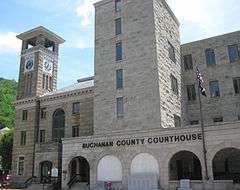 Buchanan County Courthouse, Grundy, Virginia
Buchanan County Courthouse, Grundy, Virginia Buncombe County Courthouse, Asheville, North Carolina
Buncombe County Courthouse, Asheville, North Carolina Dubois County Courthouse, Jasper, Indiana
Dubois County Courthouse, Jasper, Indiana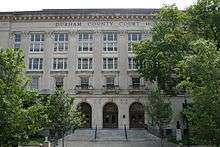 Durham County Courthouse, Durham, North Carolina
Durham County Courthouse, Durham, North Carolina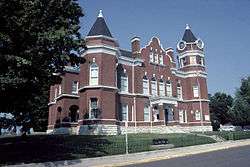 Fulton County Courthouse, Fulton, Kentucky
Fulton County Courthouse, Fulton, Kentucky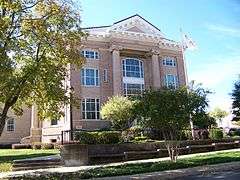 Gaston County Courthouse, Gastonia, North Carolina
Gaston County Courthouse, Gastonia, North Carolina Glynn County Courthouse, Brunswick, Georgia
Glynn County Courthouse, Brunswick, Georgia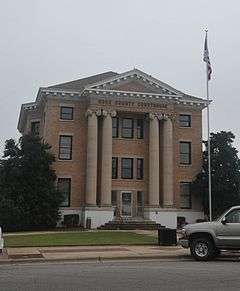 Hoke County Courthouse, Raeford, North Carolina
Hoke County Courthouse, Raeford, North Carolina.jpg) Lincoln County Courthouse, Stanford, Kentucky
Lincoln County Courthouse, Stanford, Kentucky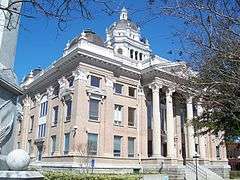 Lowndes County Courthouse, Valdosta, Georgia
Lowndes County Courthouse, Valdosta, Georgia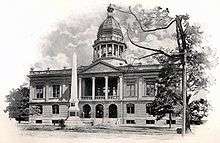 Mecklenburg County Courthouse, Charlotte, North Carolina
Mecklenburg County Courthouse, Charlotte, North Carolina McDowell County Courthouse and jail, Welch, West Virginia
McDowell County Courthouse and jail, Welch, West Virginia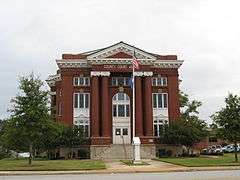 Newberry County Courthouse, Newberry, South Carolina
Newberry County Courthouse, Newberry, South Carolina- Pitt County Courthouse, Greenville, North Carolina
 Smyth County Courthouse Marion, Virginia
Smyth County Courthouse Marion, Virginia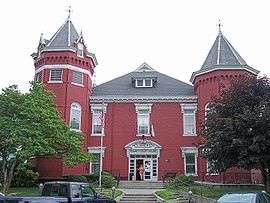 Summers County Courthouse, Hinton, West Virginia
Summers County Courthouse, Hinton, West Virginia Swain County Courthouse, Bryson City, NC
Swain County Courthouse, Bryson City, NC- Upson County Courthouse, Thomaston, Georgia
- Wilcox County Courthouse, Abbeville, Georgia
 Wilkes County Courthouse, Washington, Georgia
Wilkes County Courthouse, Washington, Georgia- Wise County Courthouse, Wise, Virginia
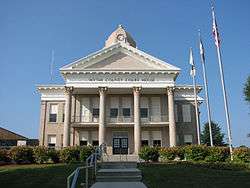 Wythe County Courthouse, Wytheville, Virginia
Wythe County Courthouse, Wytheville, Virginia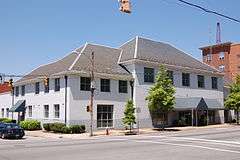 Union Station, Raleigh, North Carolina
Union Station, Raleigh, North Carolina- Southern Railway Station, Danville, Virginia
 Southern Railway Station, Richmond, Virginia
Southern Railway Station, Richmond, Virginia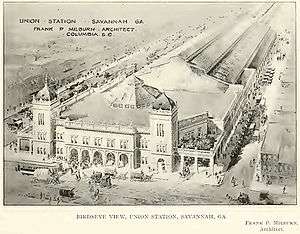 Union Station, Savannah, Georgia
Union Station, Savannah, Georgia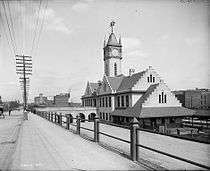 Southern Railway Terminal, Knoxville, Tennessee
Southern Railway Terminal, Knoxville, Tennessee_station_front.jpg) Southern Railway Station, Salisbury, North Carolina
Southern Railway Station, Salisbury, North Carolina Southern Railway Station interior, Salisbury, North Carolina
Southern Railway Station interior, Salisbury, North Carolina Union Depot, Hattiesburg, Mississippi
Union Depot, Hattiesburg, Mississippi- Southern Railway Station, Lynchburg, Virginia
 Durham Auditorium (Carolina Theater), Durham, North Carolina
Durham Auditorium (Carolina Theater), Durham, North Carolina- Hotel Blanche, Lake City, Florida
 Lansburgh's Department Store, Washington, District of Columbia
Lansburgh's Department Store, Washington, District of Columbia_-_Powhatan_Hotel%2C_Pennsylvania_Avenue_and_Eighteenth_Street_Northwest%2C_Washington%2C_District_of_Columbia%2C_DC_HABS_DC%2CWASH%2C508-2.tif.jpg) Powhatan Hotel, Washington, District of Columbia
Powhatan Hotel, Washington, District of Columbia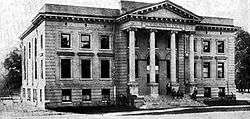 Bynum Gymnasium, University of North Carolina, Chapel Hill, North Carolina
Bynum Gymnasium, University of North Carolina, Chapel Hill, North Carolina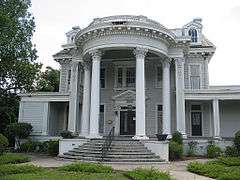 O'Donnel House, Sumter, South Carolina
O'Donnel House, Sumter, South Carolina
See also
- List of buildings by Frank Pierce Milburn, includes buildings by Milburn and Heister until Milburn's retirement in 1925
References
- ↑ Vivian, Daniel J. and Claudia R. Brown (2009). "Milburn, Frank Pierce (1868-1926)". North Carolina Architects and Builders: A Biographical Dictionary. NCSU Libraries.
- 1 2 Bryan, John Morrill: Creating the South Carolina State House, page 116. University of South Carolina Press, 1999 ISBN 1-57003-291-2.
- ↑ C.E. Turley (April 5, 1979). National Register of Historic Places Nomination: McDowell County Courthouse (pdf). National Park Service.
- ↑ "Thomas Yancey Milburn (1890-1977)". Triangle Modernist Houses. 2009-01-29.
External links
- 1901 self-published promotional book by Milburn with illustrations at the Internet Archive
| Wikimedia Commons has media related to Frank Pierce Milburn. |
.jpg)